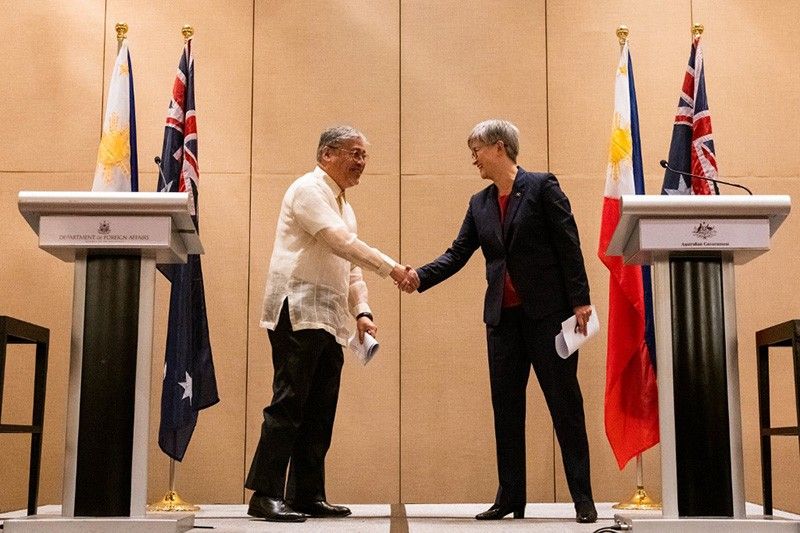Philippines and Australia: From a comprehensive to a strategic security partnership

On June 5, 2022, Australian Defense Minister Richard Marles revealed the details of an incident between a Royal Australian Air Force (RAAF) reconnaissance aircraft and a Chinese People’s Liberation Air Force’s fighter plane in the South China Sea.
A Chinese J-16 fighter aircraft flew very close to the side of the RAAF P-8, conducting maritime surveillance activities in the region. The defense minister alleged that the J-16 flew close to the side of the RAAF plane, accelerated, and cut across the nose of the bigger surveillance aircraft, then released aluminum chaff, some of which were ingested into the P-8 engine.
According to an ABC News report, a second plane was sent over the disputed waters in the South China Sea after the Chinese air force fighter plane carried out a dangerous interception of a RAAF reconnaissance plane. Australian media also revealed that both RAAF planes flew from Clark Airbase in the Philippines.
Using data from the flight-tracking website Plane Finder, Australian media sources said that P-8As were most likely operating from Clark Air Base, with each aircraft returning three hours after taking off and circling the airfield for an hour before landing.
The May 26 P-8 incident revealed that Australia and the Philippines shared a common interest in regional security and stability in the face of the looming China challenge in the South China Sea. It also publicized that both sides have shared real-world military operations beginning with their responses to the 1999 East Timor Crisis, the 2013 Super Typhoon Haiyan devastation of central Philippines, and the 2017 Siege of Marawi City.
During the battle for Marawi City, the RAAF deployed two AP-3C Orion aircraft that provided surveillance and reconnaissance support to the Philippine military’s combat operations against the Muslim militants. In the aftermath of the battle for Marawi City, Australia deployed ADF personnel to the Philippines to advise and assist the AFP in its counter-terrorism campaign against the Islamic militants—something that the ADF has been doing in Iraq.
Despite these activities aimed at enhancing the Philippine-Australia security partnership, there is a lingering perception that the two countries’ security ties could have been faster, more comprehensive, and more consistent. This view might change sooner than expected after Australian Foreign Minister and Senator Penny Wong’s four-day visit to Manila last week.
While in Manila, she declared that Australia is committed to continuing its presence in the West Philippine Sea and South China Sea to maintain peace and stability in the region. She added that Australia is open to cooperating with all like-minded states to exercise freedom of navigation and overflight over the South China Sea. And in this respect, Australia considers the Philippines a long-standing and important security partner.
Comprehensive security partnership
The Philippines has long-standing defense cooperation with Australia, facilitated by a series of bilateral agreements. The oldest is the Memorandum of Understanding (MOU) on Cooperative Defense Activities. This MOU notes an active security relationship between the Philippines and Australia, as shown by the significant number of AFP personnel undertaking training in Australian Défense Force Facilities and the potential for increased cooperative defense activity offered by the AFP modernization program.
The most important of these security agreements is the 2007 Philippine-Australia Status of Forces Agreement (SOFA) which provided a comprehensive legal framework to support troops engaged in defense cooperation activities in both countries. The SOFA provides legal guarantees to Australian forces conducting joint-counter terrorism exercises in the Philippines. It also commits the Australian Defense Force (ADF) to advise the AFP on logistics and its acquisition policy.
Former President Rodrigo Duterte’s efforts to gravitate closer to Beijing alarmed Canberra as this would strain Philippine-US relations. However, this allowed Australia to enhance its security ties with the Philippines, given that Washington and Canberra are the only countries with formalized security arrangements with Manila. Moreover, given that Philippine-Australia security relations partly operate within the context of the US-led hub-and-spokes bilateral alliance system in Asia, the bilateral relationship between Manila and Canberra was seen as robust enough to stand independently.
The dramatic improvement in Philippine-Australian security relations is reflected in the following bilateral defense arrangements: 1) Australian Embassy Note 482/17 on Defense Cooperation between the AFP and the ADF; 2) Operation Augury—Philippines, 2017—a training program conducted by the ADF to the AFP that provided for the training of more than 10,000 AFP personnel in urban combat and joint operations, air coordination in the urban environment, and maritime security; 3) The September 2018 Terms of Reference (TOR) on Cooperation between the major services of the Philippines and Australian Armed Forces; and d) The 2021 Philippine Australia Mutual Logistic Support Arrangement (MLSA).
From a comprehensive to a strategic partnership
Foreign Minister Wong said that the defense departments of Australia and the Philippines are discussing the best way to take their security partnership forward. This implied Canberra’s plan to transform the two countries’ security partnerships from comprehensive to strategic. This would involve Canberra providing Manila with surveillance drones and high-tech equipment to the Philippines to enhance its maritime domain awareness capabilities. Australia will also extend technical assistance and capacity-building exercises for the Philippine Coast Guard (PCG).
She also implied that Australia is open to joining the Philippines and the US in exercising freedom of navigation and overflight over the disputed waters in the South China Sea, given that Australia is committed to continuing its longstanding presence in the Indo-Pacific region. Finally, in her talks with Philippine Foreign Affairs Secretary Enrique Manalo, Foreign Minister Wong raised the prospect of potential trilateral security cooperation between Manila, Tokyo, and Canberra. She said Australia is willing to work “with the Philippines and other parties, other nations to help shape the region.”
A Philippine-Australia strategic partnership will strengthen mutual interests in regional security and economic stability. The Philippines can look forward to more tangible manifestations of our partnership with Australia, a like-minded country committed to uphold the rules based international order in the Indo-Pacific.
Renato Cruz De Castro is trustee and program convenor of think tank Stratbase Institute.
- Latest

























